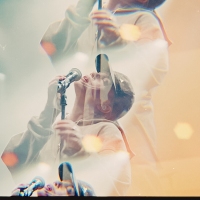 Music’s mental health crisis is worsening, and it’s killing our starsDespite a decreased stigmatisation towards mental illness and a shift towards self-care, our music industry is still in crisis.
Music’s mental health crisis is worsening, and it’s killing our starsDespite a decreased stigmatisation towards mental illness and a shift towards self-care, our music industry is still in crisis.

Saving your sanity in the music industry: “Take a step back, and breathe.”
In an industry suffering from a mental health crisis, how do you keep things in check?
Header photo of Gang of Youths by Perry McLaughlan.
As we’ve explored over the last week - World Mental Health Awareness Week - the music industry is undergoing a battle against mental health. The high demands and low pay the industry provides has much of its workers - both in the spotlight and behind-the-scenes - suffering, and on top of that, social media’s unfiltered intensity often means that artists have to tackle messages of hate and/or objectification on top of that. It’s a lot to ask for anyone, let alone someone who earns over $30,000 less than the average Australian salary - and that’s just the musicians finding commercial success.
Consequently, the music industry both in Australia and internationally are struggling. Suicide attempts for Australian entertainment industry workers are more than double that of the general population, according to a study from Entertainment Assist which also found that severe anxiety and depression are ten and five times higher respectively in entertainment workers than the general, non-entertainment working public. Furthermore, a study from Swedish company Record Union found that 73% of music industry workers surveyed suffer from symptoms of mental illness and one-third of surveyed workers experienced panic attacks, while another from British company Skiddle found 80% of musicians suffer stress, anxiety and/or depression.
So, in an industry plagued with mental illness and seemingly no way out, how do you preserve your sanity?
Reach Out For Help
Arguably the most important thing you can do is reach out. Reaching out to a peer or friend for a chat about life and work is something that always helps: it allows you to vent, but also allows you to think things over while you’re saying them out loud. There have been plenty of times, for example, where I’ve personally called a friend, family member or partner to destress about looming deadlines and work problems, emerging the other side clear-headed and focused having walked through it to a neutral party.
In more dire situations, companies such as Lifeline and Headspace are always there and accessible - providing another neutral, real-life human to talk to if you don’t have anybody else. Or, if you’re wanting to talk to someone who might understand, hit up Support Act - an Australia-wide charity supporting musicians and music industry workers facing hardship, who two years back, launched their own helpline: 1800 959 500.
Take A Step Back
For many, taking time away from their work is impossible. As relieving as it might be to take two weeks off work to travel internationally - or even to relax at home and play Link’s Awakening 24/7 undisturbed - chances are that’s not possible. For many working in the music industry, there’s no support structures in place - many work individually, or in small teams scattered between cities and even countries - meaning that as long as there’s work to do, you’re the one that has to do it. Taking time off can actually be negative in a way, as you then have to come back to double the work: your usual grind, plus all the stuff you missed while you were away.
In saying that, it feels incredibly refreshing to be able to take a step back and breathe. We’re not saying a week-long escape to Fiji, but even taking an extra 30 minutes at lunch to sit in the sun with your phone away from you gives you a chance to destress. When you have the opportunity, try to even take an afternoon off and away from your work tools, or take a day off while the rest of the industry battles hangovers (the days surrounding Splendour and the day following the ARIA Awards are prime day-off material if you’re not going).
Find Interests Away From The Hellscape of Music
One of my personal least favourite sayings, is that one about leaving your work at work. For people that work in the music industry, that’s often impossible. Music is everywhere - on the radio, on cars driving past, on billboards and social media posts - so taking a step back and focusing on things which aren’t at-all music-related can be tough: you can’t even decompress by listening to music, for example! In saying that, it’s important to remember that there’s a life beyond music - and you don’t have to be defined by it.
Catch up with friends who work in non-entertainment industries and listen to their vents. Dive into podcasts (probably not Song Exploder, though) or books that aren’t music-centric, and find interests and unrelated hobbies that spark joy: swimming and other forms of exercise right through to obsessive boomer groups and Kmart pie-making groups on Facebook are two very different examples of this which I’ve heard in recent months. Take a look at triple j’s Bridget Hustwaite, whose work with endometriosis has provided a new avenue for her creativity and motivation when things are feeling a little dry elsewhere, and keeps the ball rolling. Give her endometriosis Instagram account a follow while you’re at it.
Mentor, and Relish In The Excitement Of The Future
No matter where you look, a bright future is emerging. Sometimes, it’s good to think about that, and even better, it’s worthwhile seeing if there are any avenues for you to help the future prosper. Music-wise, keep an eye on organisations like APRA AMCOS who often run mentorship programs (one of their most successful, is their Mentorships for Women in Music Program) or online for instrument mentoring if you’ve got the skills. Elsewhere, away from music, you’d be surprised how much you’d learn working with children full-stop, so take a look at other mentorship programs and build the future alongside the future themselves.
Otherwise, it’s nice to sit back every now and again and think about the future - in multiple ways. Seeing the climate rallies organised by schoolkids around the globe - some of the biggest, if not the biggest, global protest - proved incredibly inspiring and motivating to make a change in my own life (both environmentally and work-wise), and on a personal note, imagine a possible future for yourself. As a musician, working with Frank Ocean might be a pipe-dream never achievable, but it’s somewhat motivating to think about (“Fuck yeah I’m going to work with Frank Ocean,” you’ll say.”).
Do All The Stuff You Were Told To Do As A Kid
People whose answer to everything is “drink more water” and “sleep more” are painful, but they also have a point. Things like diet, exercise and hydration keep your body - physically, mentally and spiritually, in a way - in check, and being healthy is remarkably important to keeping a sane headspace. How can you focus on being motivated and inspired, when you’re exhausted and have a braining running on 50% capacity due to dehydration? You can’t. They might be small tasks, but feeling like you’re on top of your health and sleep goes a long way in keeping motivated in other areas of your life too.
Need to talk to someone? Call Lifeline on 13 11 14, Kids Helpline on 1800 551 800, Beyond Blue on 1300 22 46 36, Headspace on 1800 650 890 or QLife – for LGBT+ persons – on 1800 184 527.
For advice and support networks for musicians and workers in the music industry, head to Entertainment Assist or Support Act Australia.
 Music’s mental health crisis is worsening, and it’s killing our starsDespite a decreased stigmatisation towards mental illness and a shift towards self-care, our music industry is still in crisis.
Music’s mental health crisis is worsening, and it’s killing our starsDespite a decreased stigmatisation towards mental illness and a shift towards self-care, our music industry is still in crisis.
 In 2019, why are we still not respecting female musicians on stage?Time and time again, female musicians are being harassed by the people that have paid to see them - and it's not on.
In 2019, why are we still not respecting female musicians on stage?Time and time again, female musicians are being harassed by the people that have paid to see them - and it's not on.